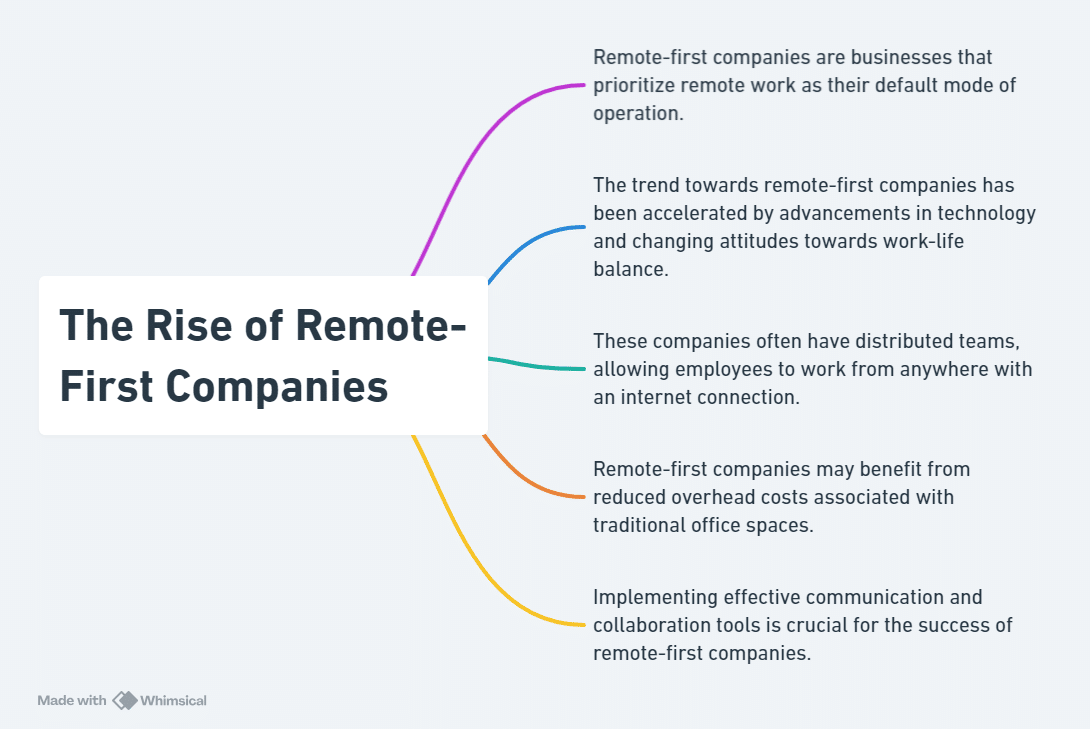The rise of remote work has been one of the most significant shifts in the modern workplace. In the past, employees were expected to commute to a physical office every day, but today, thanks to advances in technology, more and more people are online work from home. This trend is expected to continue in the future, as companies realize the benefits of remote work, such as reduced costs, increased productivity, and a wider talent pool.
The Rise of Remote-First Companies

In the evolving landscape of the modern workforce, the rise of remote-first companies marks a significant shift towards online work from home. This transformation is reshaping how organizations operate, offering unique benefits and challenges that are defining the future of work.
1. Understanding Remote-First Companies
Remote-first companies are organizations that prioritize online work from home as their primary operational model. Unlike traditional businesses that may offer some level of telecommuting, remote-first companies are designed from the ground up to function digitally, ensuring that employees can work from anywhere with internet access.
2. Advantages of Online Work from Home for Companies
The shift to online work from home offers numerous benefits for companies. It allows for access to a broader talent pool, unrestrained by geographical limitations. Cost reductions are another significant advantage, as the need for physical office space diminishes, leading to lower overhead expenses. Furthermore, remote-first companies often experience higher levels of employee satisfaction and retention, as workers appreciate the flexibility and work-life balance that online work from home provides.
3. Impact on Employee Productivity and Engagement
While transitioning to online work from home, remote-first companies have developed innovative strategies to maintain productivity and employee engagement. Virtual collaboration tools, online project management software, and digital communication platforms facilitate seamless teamwork and connectivity, ensuring that the essence of a collaborative office environment is not lost.
4. Challenges and Solutions
Despite the benefits, the transition to a remote-first model can present challenges, particularly in terms of building a cohesive company culture and ensuring effective communication. To address these, remote-first companies invest in online team-building activities, and regular virtual meetings, and provide support to ensure employees feel connected and valued.
5. The Future of Online Work from Home
The trajectory of remote-first companies suggests that online work from home is not just a temporary trend but a fundamental shift in the global work paradigm. As technology continues to advance, enabling more efficient and effective remote collaboration, we can expect to see an increasing number of organizations adopting this model.
Mastering Work from Home: Productivity, Balance, Tech, Space
The Impact of Artificial Intelligence on Remote Work
The rise of artificial intelligence (AI) has significantly transformed the landscape of online work from home. Here are some key impacts:
1. Automation of Tasks:
AI-powered tools can automate repetitive and time-consuming tasks, freeing up remote workers to focus on more complex and strategic responsibilities. This automation enhances efficiency and productivity, allowing for faster project completion.
2. Enhanced Communication and Collaboration:
AI-enabled communication platforms facilitate seamless collaboration among remote workers. AI chatbots and virtual assistants provide real-time support, resolving queries and streamlining communication. This improves team coordination and fosters a sense of connection despite physical distance.
3. Personalized Learning and Training:
AI-powered learning platforms provide personalized training experiences for remote workers. By analyzing individual learning styles and progress, AI algorithms tailor training programs to meet specific needs. This enhances skill development and ensures that remote workers stay up-to-date with industry best practices.
Overall, AI has revolutionized online work from home, empowering remote workers to work more efficiently, collaborate effectively, and continuously develop their skills. As AI continues to advance, it is expected to further enhance the experience of online work from home, making it even more flexible, productive, and rewarding. continues to advance, it will further transform the remote work experience, making it more productive, efficient, and collaborative.
Living a Healthy Lifestyle: Tips and Tricks
The Changing Landscape of Remote Work Regulations

The surge in online work from home has prompted governments and regulatory bodies to re-evaluate and adapt existing labor laws and regulations. Here are some key changes taking place:
1. Flexible Work Arrangements:
Many countries are introducing regulations that mandate employers to offer flexible work arrangements, including the option to work from home. This provides remote workers with greater control over their work-life balance and allows them to better manage personal responsibilities.
2. Employee Benefits and Protections:
Regulations are being updated to ensure that remote workers receive the same benefits and protections as their office-based counterparts. This includes access to health insurance, paid time off, and workers’ compensation coverage.
3. Data Privacy and Security:
As remote work becomes more prevalent, governments are implementing stricter data privacy and security regulations to protect sensitive information handled by remote workers. This includes measures to prevent data breaches and ensure compliance with industry standards.
4. Tax Implications:
Tax regulations are being revised to address the unique tax implications of online work from home. This includes determining residency status, allocating business expenses, and ensuring fair taxation for remote workers.
5. International Labor Laws:
With the rise of global remote work, governments are collaborating to harmonize international labor laws. This aims to address issues such as cross-border employment, social security contributions, and dispute resolution for remote workers.
These regulatory changes are essential to ensure that online work from home is conducted in a fair, equitable, and secure manner. As the remote work landscape continues to evolve, governments and regulatory bodies will continue to adapt and refine regulations to meet the changing needs of remote workers. their regulations to meet the changing needs of the workforce.
My Food My Lifestyle: Crafting a Personalized Culinary
The Evolution of Virtual Collaboration Tools

The landscape of online work from home has been profoundly shaped by the evolution of virtual collaboration tools. As the backbone of remote work, these tools have transitioned from simple communication platforms to sophisticated ecosystems that enable a seamless online work environment.
1. The Genesis of Virtual Collaboration
In the early days of online work from home, virtual collaboration tools were basic, focusing primarily on text-based communication. However, as the demand for more dynamic online work from home environments grew, these tools began to evolve, incorporating more features to facilitate comprehensive remote interaction.
2. The Rise of Integrated Platforms
The pivotal moment in the evolution of virtual collaboration tools was the integration of various functionalities into a single platform. Modern tools for online work from home now combine video conferencing, project management, real-time editing, and instant messaging, creating a more cohesive and efficient online workspace.
3. Enhancing User Experience and Productivity
With the focus on enhancing productivity in online work-from-home scenarios, virtual collaboration tools have become more intuitive and user-friendly. Advanced features like AI-assisted scheduling, task automation, and personalized notifications help streamline workflows and reduce the friction associated with remote tasks.
4. The Impact on Online Work from Home Culture
Virtual collaboration tools have not only improved productivity but also played a crucial role in shaping the culture of online work from home. They facilitate a sense of community and connectedness among remote teams, breaking down geographical barriers and fostering a collaborative work environment.
5. Future Trends in Virtual Collaboration
As we look to the future, virtual collaboration tools are set to become even more integrated with online work from home lifestyles. The incorporation of virtual reality, augmented reality, and further AI advancements will continue to redefine the boundaries of what is possible in remote collaboration, making online work from home an even more attractive and viable option for organizations and individuals alike.
My Lifestyle Business: A Paradigm Shift in Entrepreneurship
Conclusion on online work from home
The future of online work from home is bright. Remote work is becoming more common, and it is expected to continue to grow in popularity in the years to come. As remote work becomes more common, we can expect to see new technologies and regulations emerge to support remote workers.
Remote work offers many benefits for both employees and companies. For employees, remote work offers flexibility, autonomy, and a better work-life balance. For companies, remote work can reduce costs, increase productivity, and attract a wider range of talent.
If you are considering working from home, there are many resources available to help you get started. There are websites and books that can provide you with tips and advice on how to work from home effectively. You can also find online communities where you can connect with other remote workers and share tips and experiences.
Boost Your amazon work from home Success with Key Strategies
Question and answer
How do I start an online work from home?
To start an online work from home, first identify your skills and interests to determine a suitable job or business. Set up a dedicated workspace to stay organized and focused. Invest in reliable technology and internet connectivity. Explore online platforms and job boards for remote opportunities that match your expertise. Network with professionals in your field through social media and online communities. Develop a routine that balances work and personal time effectively. Continuous learning and adaptation to digital tools will enhance your online work from home experience, ensuring productivity and job satisfaction.
How to earn money online?
Earning money online has become a viable option for many, especially with the rise of online work from home opportunities. Individuals can explore various avenues such as freelance writing, graphic design, or web development on platforms like Upwork or Fiverr. Online tutoring or teaching languages on websites like iTalki or Teachable offers another path. For those with a knack for sales, e-commerce through sites like Etsy or eBay can be lucrative. Additionally, digital marketing, affiliate marketing, and content creation for YouTube or blogs present viable ways to monetize online skills and passions from the comfort of home.

